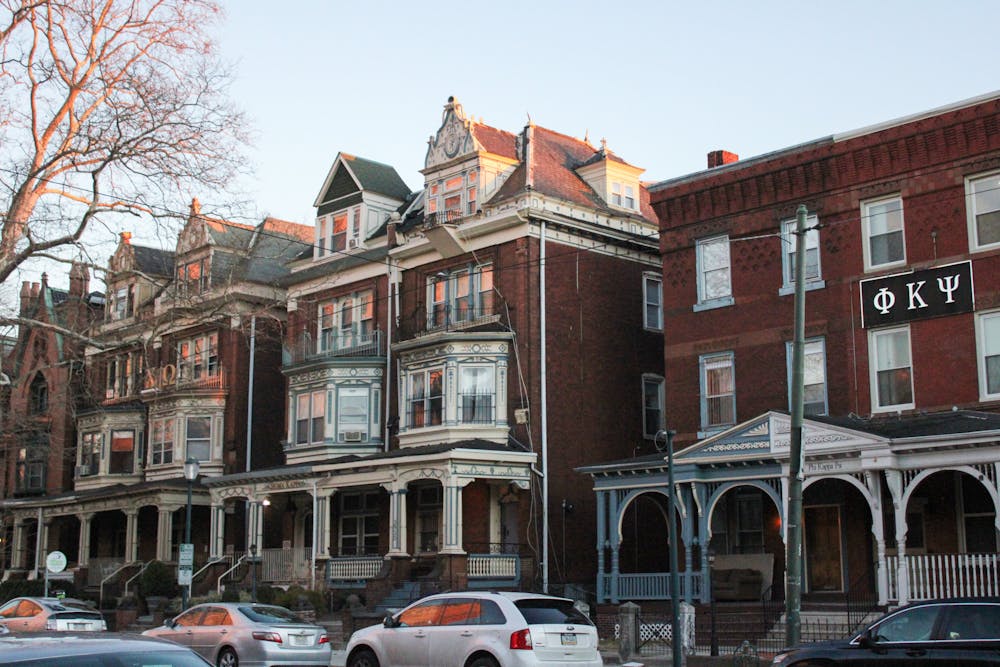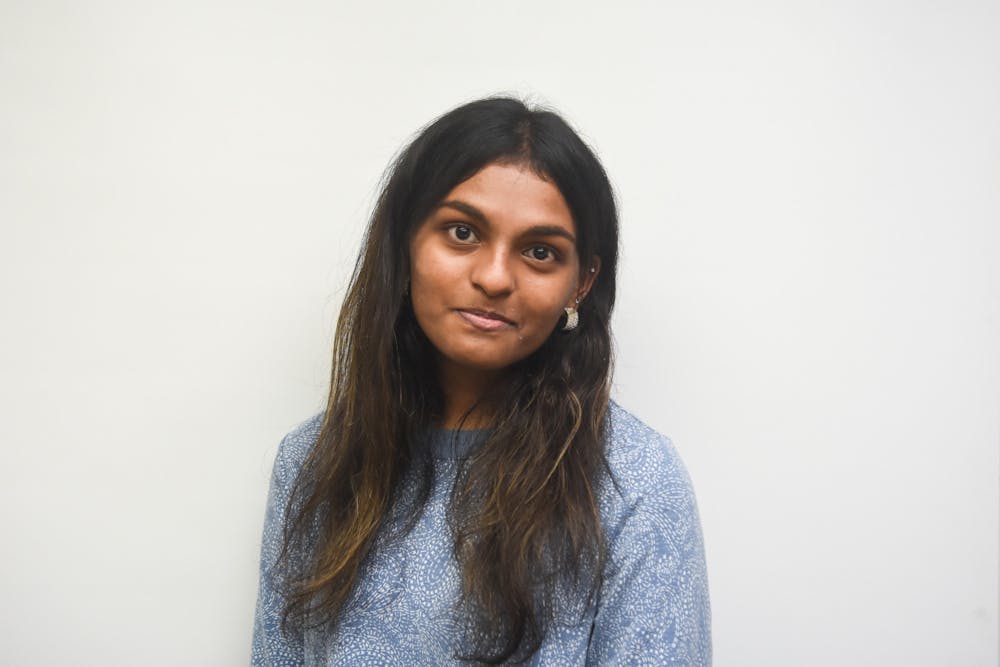
A row of fraternity houses, located on Spruce Street.
Credit: Oscar VasquezWhen I was accepted into Penn, my friends and family were convinced that I would become famous.
I was, after all, going to matriculate at the school where the current American president held the title of Benjamin Franklin Presidential Professor of Practice, and the name etched across my mascara tube now denominated a first-year dorm. Among the sea of almost 10,000 undergraduate students, I would surely speak with—and maybe even befriend—someone who lived outside of the obscure average person’s life.
During one of many coffee chats that marked my early days as a Quaker, the subject of Penn’s so-called scene arose in my conversation with a fellow first-year.
"I know a girl who knows a guy from somewhere in Eastern Europe," she began. "He snuck into a party and saw several of them."
My friend was, of course, referring to members of the so-called scene. Students so elusive that no one outside of their immediate circles is aware of their major, dorm room, or oftentimes their existence at all. They're not among the students we expect to run into on Locust Walk while walking to class.
That evening, I had spent much of my time cloistered in my dorm, binge-watching a Turkish series in the name of immersive language learning. I needed air.
At 1:00 a.m., I made the mindless decision to cross the intersection of 34th and Walnut Street. It was the brink of the weekend and someone was bound to throw an event coupled with intoxicants on “frat row.”
As I’d expected, the doors to these exclusive socials were strict. These ill-reputed entrance setups varied by host, but guidelines for admission typically range from membership in a well-renowned social circle to following a predetermined dress code.
Ahead of me, a frat brother momentarily left his place beside the crowd manager to address those of us in line directly. “This,” he made a sweeping gesture, “is my job every week. I know that some of you have never come here.” For a brief moment, our eyes connected.
"Do you know someone inside?" he asked me in what appeared to be a feigned state of sobriety.
I gave him a deadpan look. "Yes."
And I did. I was acquainted with multiple members of this fairly well-regarded fraternity. However, had he asked me if I'd received the coveted invite to this clearly closed event, my answer wouldn’t have been as confident.
He jabbed at his phone's keypad and perched on a bench flanking Steinberg-Dietrich Hall. Beneath the canopy of leaves formed by trees lining Locust Walk, impassioned students were in various states of undress.
And with that provocative sight, I left.
Clearly, I was yet to obtain the requisite popularity credit to even afford the figurative ticket for entry. As I’ve learned, my depravity wasn’t due to my lack of friends. Rather, I’m from South Carolina. Not the elegant seaside French Quarter of Charleston's tourist district, but the rural grasslands and middle to low-income suburbs that constitute much of the state. It makes sense, I suppose. When has the sorority girl ever been from middle America or the former plantations of the Deep South?
In a possible fit of tiredness, I’d deemed Greek life to be the evil underlying human idiocy. To increase even slightly in Penn’s social hierarchy, was I expected to spend evenings abandoning my executive function? Maybe I sound like the “prude” I was deemed to be in middle school, but these are contentious times. With many eyes on us, are we not responsible to uphold at least a guise of dignity off-campus?
And to my dismay, I realized that this culture was adopted by many of Penn’s South Asian American students. These are my people — people that, as Americans themselves, don’t question the authenticity of my Lowcountry slang but can also relate to my struggles of applying for an Indian Visa. Nevertheless, I struggled to engage with the community past small talk at the occasional soirée or stage show.
Penn’s South Asia Society annually organizes a “Back 2 School” party at a club venue in Philadelphia’s downtown and Penn Dhamaka, our all-male South Asian dance troupe, recently hosted a post-performance social north of Center City. Per usual, drinks flowed freely at these events. My intent isn’t to signal virtue, but I’m disappointed by how even cultural organizations are complicit in upholding the stratification inherent to party life.
Fraternity and sorority life, as well as the broader scene culture, are undermining the core purpose of a college education — the pursuit of new experiences and connections. Inevitably, my social circle at Penn does not vary much from the socioeconomic demographics of South Carolina. Clearly, it's time for us to rethink what it means to truly foster a community that embraces diversity rather than one that perpetuates exclusivity.
While I now consider membership in the scene and all its perks to be a double-edged sword that’s not receiving its due criticism, I don’t think that I will pursue my attempts of confining this lifestyle to being either “good” or “bad.” If the individuals comprising such societies can pursue their self-interests while retaining compassion for their fellow classmates, the intention of forming a sister- or brotherhood is almost … wholesome? And in that case, maybe I’ll regret having written this column at all.

MRITIKA SENTHIL is a first year studying Management and Russian & East European Studies from Columbia, South Carolina. Her email is mritikas@upenn.edu.
The Daily Pennsylvanian is an independent, student-run newspaper. Please consider making a donation to support the coverage that shapes the University. Your generosity ensures a future of strong journalism at Penn.
Donate







